- November 20, 2018
- Posted by: SportsV
- Categories: Features, Home News, Industry News, News
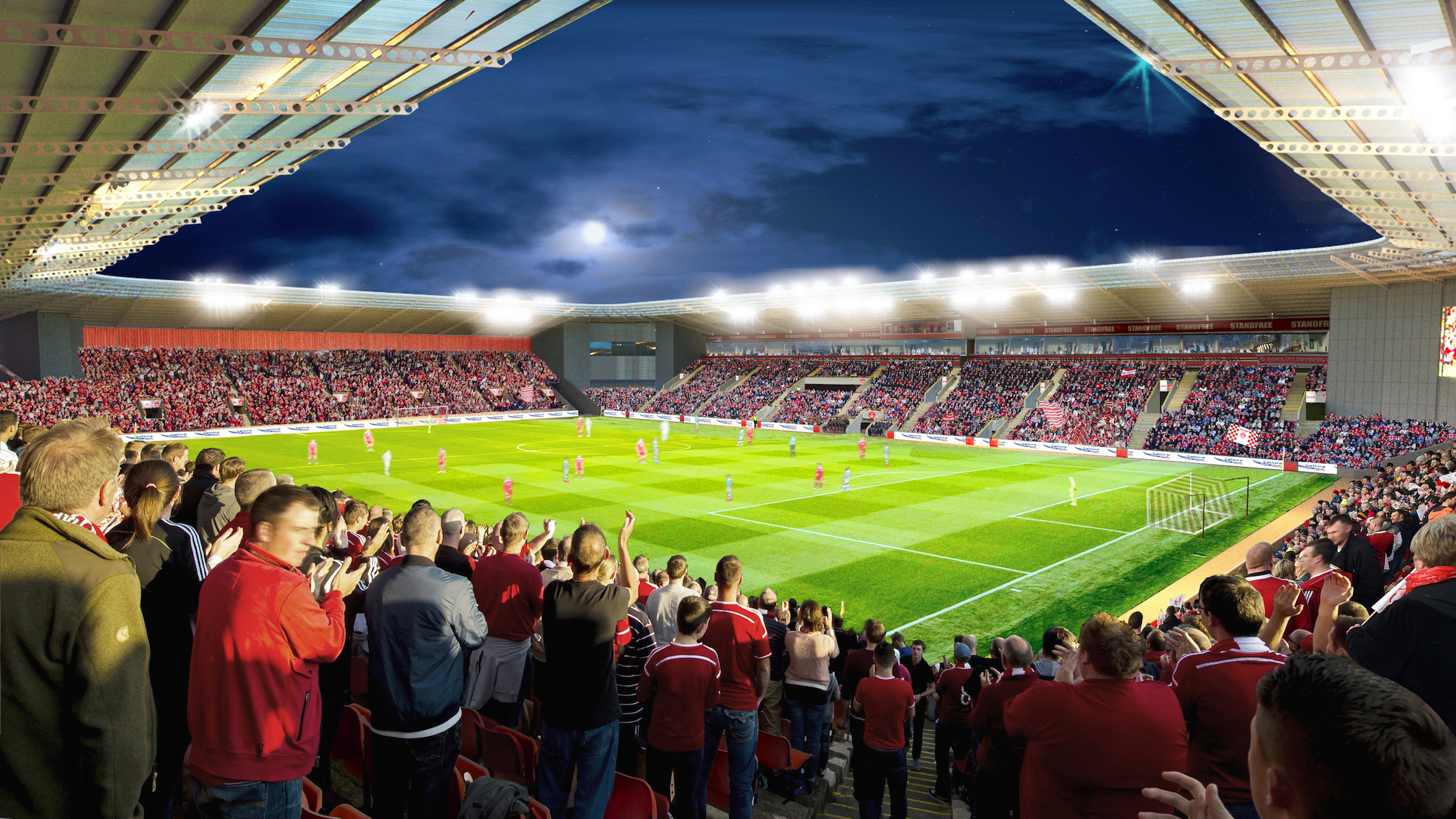
In this latest interview, we hear from Robert Wicks, Commercial Director and main board director at Scottish Premier Football League side, Aberdeen Football Club.
Can you start off by telling us a little about your career journey and highlights to date?
I was born in South Africa and went on to complete an Honours Degree in Economics and Journalism at Rhodes University before joining one of the country’s leading media organisations. During my six-year tenure at Times Media, I was fortunate to be able to launch a new daily sports newspaper, the first of its kind in Africa, and the first new daily paper in South Africa for 14 years.
After that, I moved to Italy in 2000 to take on an exciting role as Head of Marketing and Sponsorship with the Superbike World Championship, a role that would enable me to travel the world, learn new languages and establish my credentials in the sporting sector.
I then joined motorcycle manufacturer Suzuki to run their commercial programme in British Superbikes and MotoGP, the pinnacle of two-wheel racing. Success there lead to a role running a global powerboat racing series.
I joined Powerboat P1 in 2007 as Commercial Director, tasked with transforming what was essentially a hobbyist pursuit into a global sporting property. After securing new host venues in France, Spain, Sweden and Turkey, and generating significant new revenues, I was appointed chief operating officer with responsibility for operational performance. In 2017, I became managing director, responsible for overall business performance during a significant period of organisational, operational and technological change, which included the delivery of a number of award-winning events.
I was subsequently appointed as Commercial Director at Aberdeen Football Club at the start of 2018.
I have worked with rights holders, brands, host venues, broadcasters, governing bodies and agencies, and very much enjoyed working with international cities to develop and execute major event strategies. I’ve been fortunate to travel to more than 60 countries and have lived in London, Rome, Johannesburg – and now Aberdeen. I’ve also been able to write six books and I’m an avid golf fan.
Following your appointment as Commercial Director at the start of the year, you were made a main board director for Aberdeen FC (AFC) at the end of July. What have been the main challenges you’ve experienced so far?
I’ve certainly welcomed the change to football [soccer] as the market is so much bigger. Dealing in a niche sport like powerboat racing certainly had its challenges but it proved to be a great experience and I have been able to come to the new role without too many preconceived ideas about the sport, the league or the Club.
Aberdeen benefits from being the European hub for the oil and gas industry, and as a club we enjoy a tremendous relationship with many companies and brands in this sector, including our official club sponsor, Saltire Energy, who have partnered the club for several years. The city is just coming out of a tough four-year downturn in oil prices but with more than £9bn in investment going on across the city and wider Aberdeenshire region, there is renewed optimism and a real buzz about the place.
One of the key challenges has been getting a variety of commercial initiatives underway to make sure that the Club is suitably positioned to take advantage of the changes we are seeing the sponsorship market and ahead of our new stadium launch. We’re also keen to make the most of the enviable demographic the Club can offer to potential partners.
From a footballing perspective, the season is certainly intense and with the way Scottish football is structured – both domestically and in terms of European competition – there is very little downtime for the players or staff.
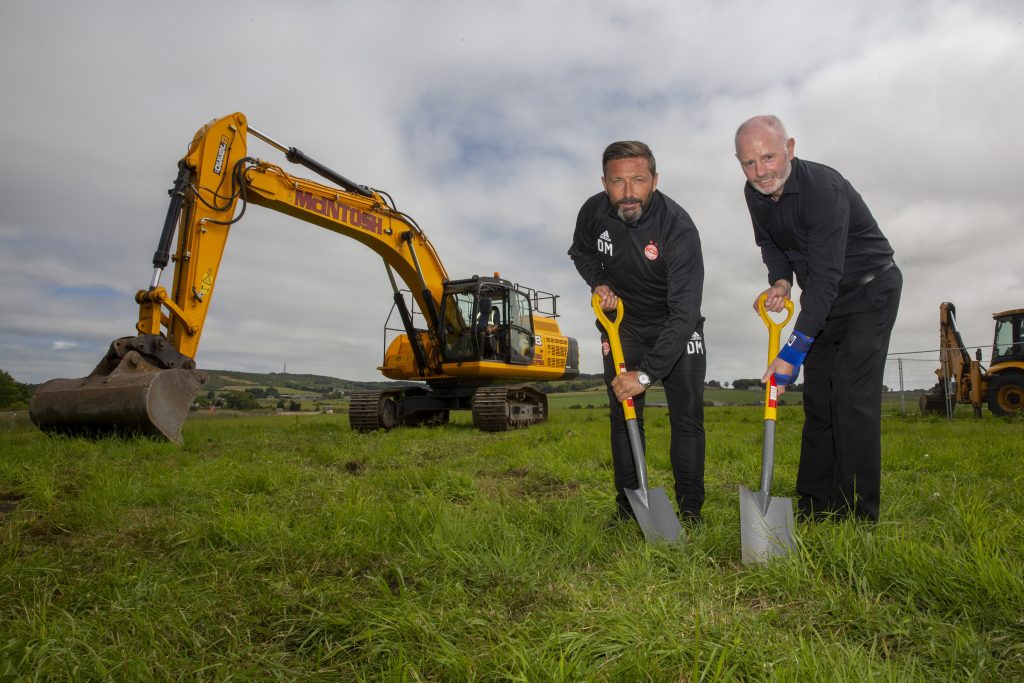
Aberdeen FC strengthened its senior management team (your appointment being a key part of this) to deliver an ambitious strategy over the next 3-5 years that includes growing revenues from £14.5m to £20m. Can you give us some insights into how these goals will be achieved?
The Club has three key objectives in the coming few years: to become a UEFA Top 100 Club; to grow our turnover; and make the transition to our new stadium, training facilities and community hub. To ensure we achieve this, we have three distinct strategic pillars: football success; sustainable increased turnover; and improving fan engagement.
Success on the pitch is paramount to our commercial success and the two go hand in hand at any football club. We have enjoyed terrific success with Derek McInnes as manager, with four successive second place finishes in the league (operating in a far smaller stadium and on just one sixth of Celtic’s turnover) and that form has continued into the current season, which includes a place in the League Cup Final in early December. Reinforcing our strategy of development, retention and recruitment, together with a consistent and common approach running through from our Youth Academy to the First Team will help to drive success on the pitch.
In terms of increased turnover, the initial focus has been looking at longer-term, sustainable income streams. Off the back of Aberdeen being Europe’s oil and gas capital, together with two outstanding universities, we have fans the world over and one of the key challenges is to make the club think more globally about its supporters. To that end, we launched a new membership programme in March 2018, which saw 6,500 fans sign up to a monthly subscription, the proceeds of which were ring-fenced for exclusive use by the football operation, helping the First Team budget, sports science and our Youth Development Academy. The initiative has generated more than £1.25m in new revenue for the club but more importantly, it has enabled fans around the world to get involved and take advantage of a range of benefits.
We have also launched a new B2B initiative called ‘By Official Appointment’, an exciting new affinity initiative for the local business community, which formally brings together a family of businesses and loyal Aberdeen FC fans under a common banner, with a view to generating more business and helping supporters receive the best possible products, offers and service.
The commercial team have also spent a lot of time creating new inventory and have secured a new Official Education Partner, as well as a new Health and Wellbeing Partner. Inroads have also been made to better exploit our extensive content portfolio and are looking at the best way of monetising our digital assets. eSports is an area of significant interest we’re starting to explore. The SPFL’s domestic TV rights deal with Sky was recently announced and although not at a level that the clubs had hoped for, the improvement will help to drive us towards our wider revenue target.
To better engage with and effectively grow the Dons’ supporter base, we have embarked on a clear strategy based on taking a more global outlook. Closer to home, we’ve established an open and transparent Fans Forum, which meets regularly to deal with key issues the supporters feel most passionate about. Talking to the fans and giving them the opportunity to better engage with the Club will be a key driver moving forward.
We’ve also recently completed some hugely insightful demographic analysis of our fan base, which has provided some great insight. Allied to this is a new communications strategy, positioning the Club as a ‘challenger brand’ and this approach has certainly resonated with the fans and holds appeal for a number of brands too.
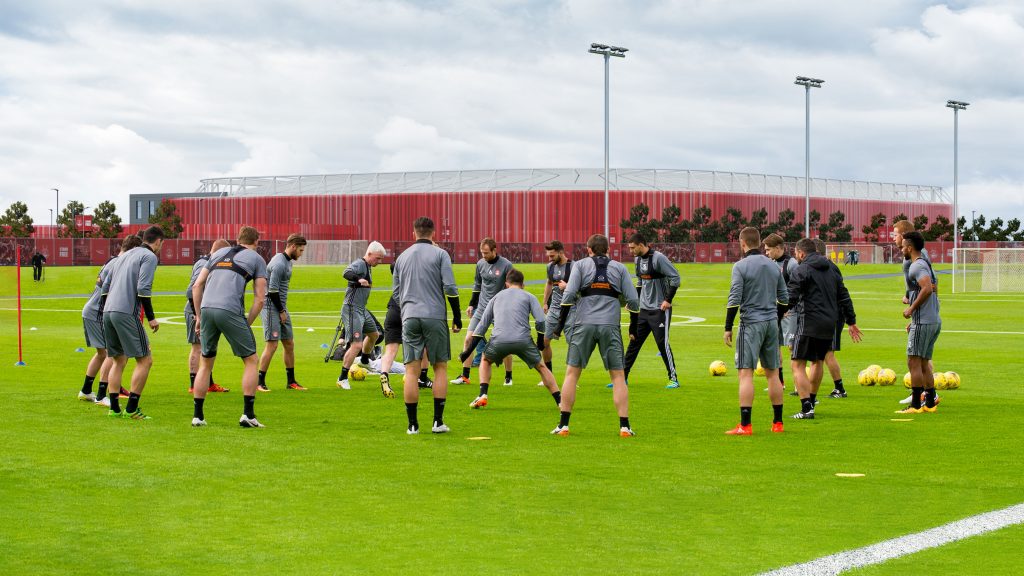
One major CapEx project for the Club is the £50m investment in a new training campus, as well as a new stadium. Can you tell us more about the projects, the expected time lines, details as to upcoming tenders, etc?
The current stadium, Pittodrie, dates back to 1903 and with it being a land-locked location with extremely limited development potential, the club have been looking to make a move to a new stadium for a number of years. Considerable work was undertaken on two potential sites, but neither of these proved viable. More recently, the Club identified a site to the west of the city centre, which has sufficient space to develop our new stadium and a state-of-the-art training campus. Site preparation is well underway already, with the main contractor starting work in December 2018 on Phase 1, which will incorporate multiple playing pitches and pavilion. These facilities will be completed by summer 2019 and will deliver essential, best-in-class Professional Training Facilities, a top-class Youth Development Academy and a Community Hub available for use seven days a week for use by the whole community. The latter will be run by the club’s award-winning AFC Community Trust.
Phase 2 is the development of Aberdeen Football Club’s new 20,000-capacity stadium, the largest new-build stadium in Scotland in over 100 years. The campus will act as a beacon for sporting performance in the North East of Scotland and act as a catalyst for wider community outreach. We haven’t set a date for the commencement of Phase 2, as our focus is very much on getting Phase 1 delivered successfully.
In the meantime, we’ve invested in some detailed research around the naming rights opportunity that will come with the stadium; we’re visiting a broad range of stadia and sporting venues to look at best practice and we’re working some of the best partners in the industry on the wider project to deliver what I am certain will create a unique sporting venue, among the best in the UK and Europe.
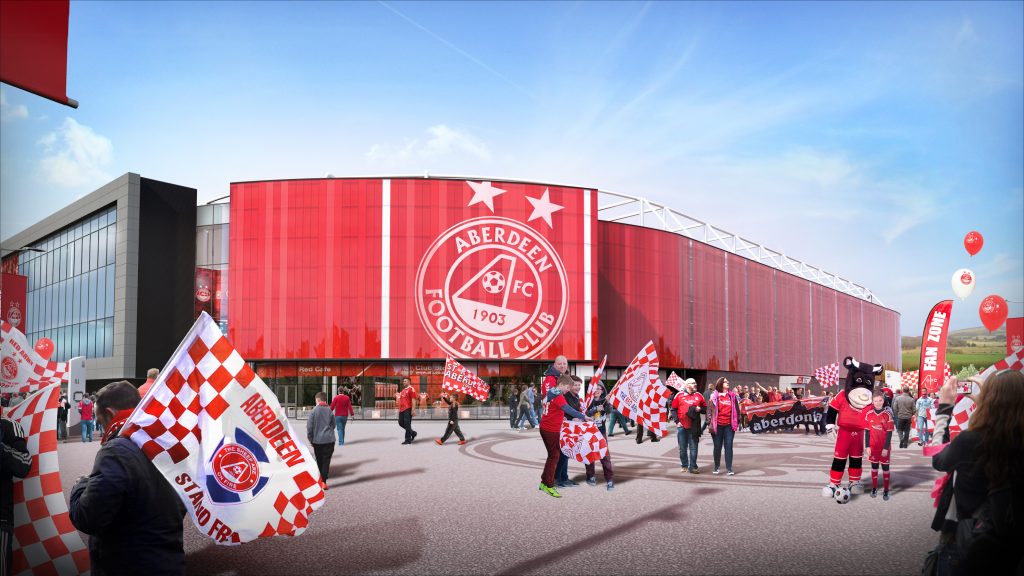
With Aberdeen regularly qualifying for European Club competitions and with the expected transformation of European Club Football to a greater competition, AFC has the opportunity to be a key player in this new format. Can you expand on this in relation to the opportunities for television and media rights to become a much more valuable revenue stream?
The possibility of a third European competition is one that we would welcome. Whilst some initial announcements have been made, there remains little detail in the way it will fit into the overall competition structure. It should mean that there are less qualifying rounds for all teams before the group stages start which would certainly be well received. Working closely as I do with Duncan Fraser, our CEO, who represents us at the ECA [European Club Association] and was on the Competitions Committee, it will come down to issues around the access list, coefficient points as well as financial distribution.
Additional income from new TV rights around a third competition would obviously add to the bottom line, but the new format would bring other added benefits, as the Club generates considerable income from our home gates on European nights, not to mention new sponsorship and commercial inventory we can take to the market.
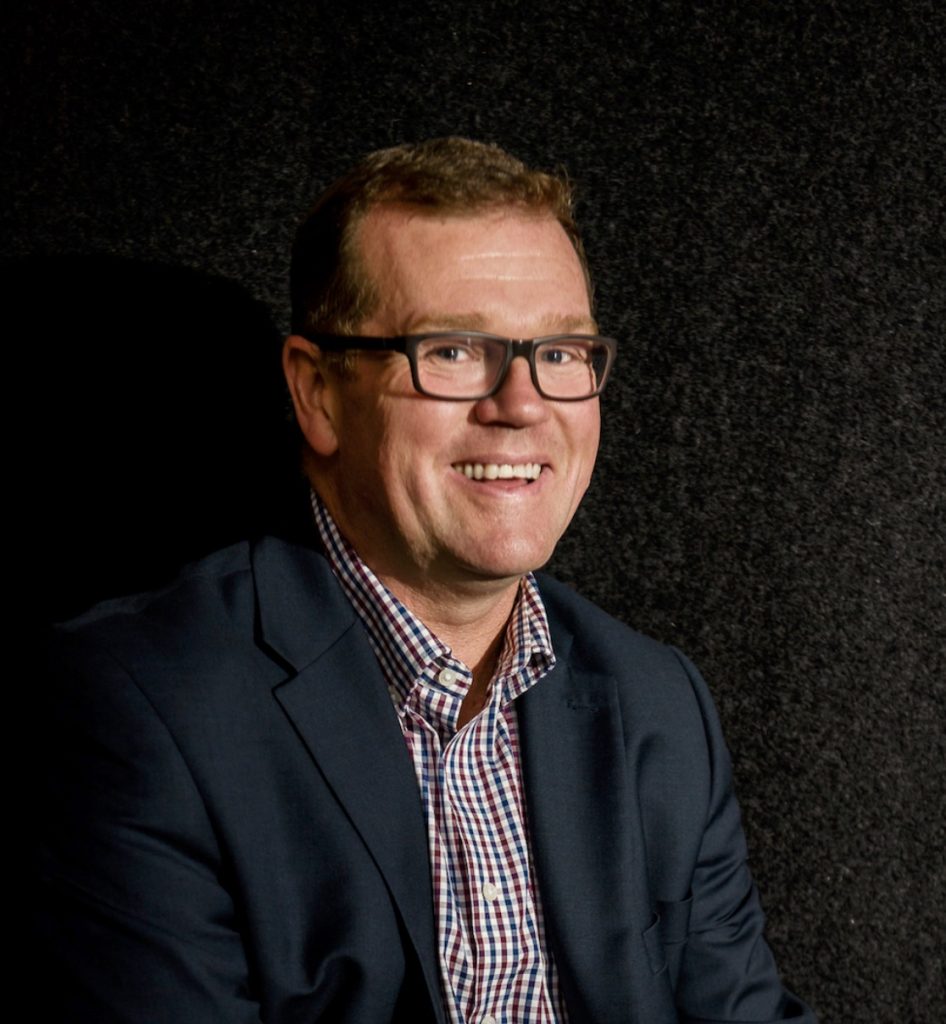
Huge thanks to Robert Wicks for taking the time to do this interview with us.
Images, courtesy: Aberdeen Football Club
Project Stats
The planning application to Aberdeen City Council for the 24.5 hectare site at Kingsford includes community and sports facilities; a football academy comprising outdoor pitches, pavilion and ancillary buildings; and a 20,000-seat capacity stadium along with associated access roads, parking, landscaping and engineering works.
Subject to planning approval, the proposals will see more than £50m invested to create a new home for the Dons; provide a base for the significant expansion of the award-winning work of Aberdeen FC Community Trust on social inclusion, participation in sport and healthy lifestyles for all ages across the region; and create a focal point for footballing excellence in the north of Scotland.
The project will be delivered in two phases, with the community and sports facilities and football academy constructed first and the stadium in the second phase.
Phase 1 of the Aberdeen FC project will deliver essential, best-in-class professional training facilities, provide outstanding youth development opportunities and act as a hub for community use seven days a week, including multiple playing pitches and a technologically advanced pavilion.
Phase 2 includes the development of the Club’s new 20,000-capacity stadium, the largest new-build stadium in Scotland in 100 years.
Aberdeen-based McIntosh Plant Hire began the initial earthworks and ground remediation in preparation for the building works last month, with main contractor works to commence in December.
The existing team of experts, who have been working on the plans throughout the planning process, are all Aberdeen-based and include Burness Paull, Fairhursts, Halliday Fraser Munro, TMC, McLeod & Aitken and TUV-SUD.
The Club has also just this week appointed Morrison Construction as the principal contractor for the construction of the community sports hub and football training facilities at Kingsford.
Morrison Construction, a leading Scottish contractor with a local base will take control of the site as soon as the earthworks are finished and then project manage the construction of all the various elements through to completion, which is expected to be summer 2019. This will include the construction of the training pavilion, groundsman’s accommodation, three professional training pitches, two 3G pitches and one grass pitch, the latter being mainly for use by Aberdeen Football Club’s Community Trust.
The appointment of the principal contractor brings the total value of contracts now let to around £8m.
The Sports Consultancy’s rights marketing consulting team is working with the Club on the development of their sponsorship strategy, exploring opportunities to enhance and augment AFC’s existing commercial programme to provide a range of partnership opportunities, which build on the profile of the club and maximise investment from leading brands.

